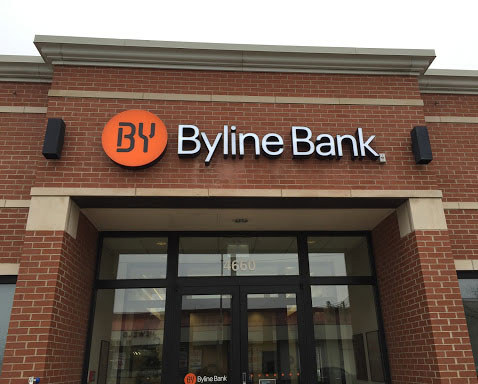What makes your rebrand implementation a success? At first glance, it seems like an easy question to answer. There seems to be a universal set of criteria: You’re aiming to complete your rebranding on time, on budget, and on brand. While these are critically important metrics, how well you address additional strategic considerations will also define rebranding implementation success for your company. Because inevitably, if you rebrand, you will need to address challenges unique to your company.
The good news: others before you have faced tough situations, and many have delivered stellar results.
From healthcare to financial services and technology, across company sizes and geographic span of reach, marketing leaders at these six organizations have taken a strategic approach to rebrand implementation and delivered substantial business benefits. Rebrand implementation can be key to instituting improved processes, achieving higher brand impact, and easing the burden of complying with legal or regulatory issues. Read on to be inspired by the real-life achievements of these six companies, and learn how BrandActive helped them reach their objectives. Chances are, their stories will spur ideas to help you succeed with a current or future rebrand.
1. DXC: The dollars and cents of renaming a company

Today, we know DXC Technologies as the company that was formed when CSC and Hewlett Packard Enterprises merged into one entity. But the decision to rename the tech company was not a done deal when BrandActive was asked to create a strategic rebranding roadmap. So first, we analyzed the potential costs and effort required to execute against four different naming options—retaining the CSC identity, refining the CSC identity, combining CSC and HPE into a new name, and creating a new brand name. The merged entity chose the last option in part because our analysis revealed that the cost savings of continuing to use the CSC name did not outweigh the impact and benefits of a new brand. Then, we worked with DXC to plan for and transition key branded assets worldwide on a tight timetable. That included creating detailed specs and managing the process of converting interior and exterior signage. In the end, signage came in under the authorized spend.
The approach to rebranding DXC’s digital collateral worldwide entailed:
Identifying which organizational unit owned each piece of collateral and the corresponding format
Recommending and implementing a digital asset management (DAM) platform to organize it all
Recommendations that rationalized the total number of pieces without affecting impact
Supporting DXC’s agency with logistical and budget management assistance
The program manager at DXC later said, “The BrandActive team brought technical expertise, top-level work quality, and professional organization to a complicated and broad-reaching program…You managed every aspect of rebranding.”
2. Allstream: meeting the timing requirements of a capital restructuring deal
When private investors bought AT&T’s business-to-business unit in Canada, the new entity was rebranded as Allstream. Contractually, Allstream needed to remove all traces of the AT&T name within six months—breakneck speed for a rebrand—while uniting six existing entity names (AT&T Canada, CNCP, ACC, Netcom, MetroNet, and Montage-DMC) under one new brand. Failing to meet this aggressive timeline would trigger financial penalties. Another risk was failing to gain employee and customer buy-in. This process typically takes considerable time and effort and has a long-term business impact.
Rebranding checklist | Over 150 branded touchpoints
Is your company in the midst of a rebrand or planning for one? Our free rebranding checklist is a great way to start to scope what is involved with a initiative like this.
BrandActive helped Allstream define the scope of the initiative, then developed the brand transition strategy and an organizational process that tied into Allstream’s proprietary marketing campaign/initiative development processes. By tapping BrandActive’s expertise in rebrand implementation, Allstream controlled costs, ensured quality standards were met, and critically, set the stage for ongoing brand compliance. The project was completed two months ahead of schedule and 30% under budget. Business results underscored magnitude of rebrand success, and did market research: Allstream’s customer base remained loyal and grew while brand recognition and acceptance metrics scored high.
3. Centura Health: improving brand impact through better brand and marketing operations

After years of acquisitions, Centura had thousands of redundant branded assets and multiple approaches for creating and managing brand and marketing assets across its 17 hospitals, other locations, and service lines. To improve patient experience and brand consistency while addressing cost and operational inefficiencies, BrandActive worked with Centura to find ways to rationalize and simplify branded assets, marketing processes, and workflow. Among the priorities: branded asset optimization, form simplification and a range of process improvements.
With BrandActive’s help, Centura reduced marketing collateral from 5,000 to under 3,000 pieces. The video library was also streamlined and its brand consistency improved
By rationalizing to fewer, clearer forms and revamping the ordering and inventory process, the number of forms in use by patients and staff dropped 50%
A new single ID badge system with consistent brand design has simplified life for Centura’s practitioners—but more importantly, patients can now easily identify the role of each Centura staff member they interact with
With this groundwork in place, Centura has made gains in ongoing brand impact and consistency—and has the framework to continue to streamline day-to-day brand and marketing operations.
4. Tervita: Repositioning externally and internally as a single solution provider
The former CCS had two goals when it united 12 companies in the energy and environmental services sector. The first goal was to communicate that Tervita provides a broad range of solutions to oil, gas, mining and industrial companies and offer it all under one moniker–Tervita. The second goal of consolidating to a single brand was to centralize and streamline overall operations.
From the beginning, BrandActive took on the role of objective consolidator with Tervita, ensuring that accurate data on branded assets was collected, analyzed, and presented, using methods that led to reliable, fact-based recommendations. Our team developed an implementation strategy and specific transition plans for each branded asset category, including fleet and equipment. We also provided the hands-on assistance Tervita needed to prepare and execute the rebrand launch—from technical specifications and manufacturing information to vendor selection and management—and handled the acquisition of key signage.
Implementing this rebranding was an early test of the combined organization’s ability to harmonize disparate processes and perspectives and act as one. BrandActive helped Tervita’s business units work cohesively together to successfully launch a “big bang” brand reveal. Furthermore, the project came in under budget and established guidelines and processes for brand consistency across all business lines.
5. Byline Bank: planning for brand consistency on a smaller budget
Byline Bank is the name of the former North Community Bank, a regional institution that now operates scores of branches and holds over $5 billion dollars in deposits. Before adopting the Byline name, the Bank used to do business under six different names.

The rebrand to Byline Bank was spurred by the Bank’s new owners, who after deciding on the new name and identity, turned to BrandActive to help them understand exactly how much it would cost and how long it would take. Planning for a united brand was going to be complicated: the age and condition of the branches and their use of branded assets varied greatly. Customers could clearly see huge disparities, especially in signage and branded environments. As a result, there wasn’t a “one-size-fits-all-branches” rebrand implementation solution.
With the support of representatives from key functional areas of the company, we first gathered information about the Bank’s branded assets. All uses of the brand—from signage and marketing and HR materials, to ATM machines, IT systems, and online and mobile banking apps—were inventoried. Then, BrandActive developed three brand transition scenarios including the scope and cost estimates for each. Each scenario differed in total cost, application quality, and the timing of asset replacement, and described ways to realize economies of scale and drive consistency. In addition, BrandActive:
Examined the implications for ongoing brand management. (For example, installing a completely new signage system would reduce normal operating maintenance and replacement costs)
Provided specific options for converting each type of branded asset
Developed a roadmap for the implementation phase of the initiative
BrandActive’s rebranding implementation plan put Byline Bank in the position to achieve cost reductions ranging from 10% to 30%. It also provided schedule recommendations to allow Byline to pay for brand change over time along with a pragmatic path to more consistent customer experience. An ideal rebrand success story!
6. Garnet Health – moving forward on rebranding despite disruption
When Garnet Health’s management decided to rename what was then called New York Greater Hudson Valley Health System, the goal was to bring all eleven of its locations under the same core message of excellence. They couldn’t possibly foresee that implementation of the rebrand would coincide with a global pandemic.
Even without the complications of COVID-19, this rebrand was particularly complex as it involved a legal name change for each site as well as the change to the parent company’s name. Garnet Health needed to address all branded assets, including exterior and interior signage, ID cards and badges, fleet, uniforms and more. Wanting to fully understand the scope and the resources required, Garnet Health approached BrandActive while its management was still exploring name possibilities. BrandActive’s brand implementation experts were able estimate the costs of the project and plan for potential scenarios even before the rebranding work had begun. Among BrandActive’s other key contributions to planning and implementing the rebrand were:
Developing the budget for branded asset change
Creating detailed signage and fleet branding guidelines
Managing the RFP process to source vendors for business cards, fleet vehicles, signage, and uniforms
Working with Garnet Health’s legal counsel to ensure compliance with legal requirements governing the brand work
BrandActive’s experts had already helped Garnet Health put rebrand project structure and processes in place when COVID-19 hit in the midst of the activation phase. The combined BrandActive/Garnet team rallied to continue the work and the rebrand was launched in the summer of 2020. Ultimately, the project came in on time—and at 10 percent under budget. The Executive Director of Marketing and Communications at Garnet Health said, “…the activation period fell upon the most challenging time in the past 100+ years – the COVID-19 pandemic. From up-front planning and strategy, to execution and follow through, BrandActive was thorough, accurate and forward-thinking which helped us successfully rebrand ourselves and continue to serve our community in their time of need. We couldn’t have done it without them.”
Rebrand implementation strategy: clearly, one size does not fit all
DXC’s approach to rebranding saw it successfully through a mega-merger, while Tervita nailed implementation of a rebranding designed to reposition the company. Allstream’s rebrand was completed both fast and well, avoiding the financial penalties it would have accrued if there had been delays. Centura’s effort to retool brand and marketing processes not only improved the patient experience, but also laid the groundwork for efficient and effective brand and marketing operations going forward. The Byline Bank case points out that careful planning can overcome difficult obstacles—including a highly fragmented brand as a starting point—and make the most of tight budgets. Finally, Garnet Health’s story shows that even in the midst of a global pandemic, a healthcare system can gain the benefits of rebranding even while continuing to meet the urgent needs of the community.
Reading these unique cases are a great way to start thinking about your specific rebrand challenges and how to solve them. Intrigued? For more inspiration, check out the 20+ case studies posted to our website, or contact us for an up-close look at the best practices we help bring to the rebranding process.



